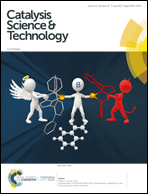The transient reduction of NO with CO and naphthalene in the presence of oxygen using a core–shell SmCeO2@TiO2-supported copper catalyst
Abstract
This work studied the reaction of common pollutants on a catalytic surface under oxidizing conditions. CO and naphthalene were used to reduce NO in the presence of oxygen during the transient heating of metal oxide nanoparticles. The latter consisted of a core–shell SmCeO2@TiO2 support with a TiO2 core and a samarium-stabilized CeO2 shell, impregnated with copper and potassium. The addition of potassium simulated the gradual accumulation of an alkali metal during biomass combustion, which can poison the catalyst. The Cu/SmCeO2@TiO2 catalyst achieved the complete conversions of NO, CO and naphthalene at 225, 236 and 255 °C, respectively. Even though the inclusion of potassium had the expected negative effect, the K/Cu/SmCeO2@TiO2 catalyst was still able to fully convert NO and CO at 323 and 299 °C, respectively, whereas a maximum naphthalene conversion of only 66% was obtained at 350 °C.



 Please wait while we load your content...
Please wait while we load your content...